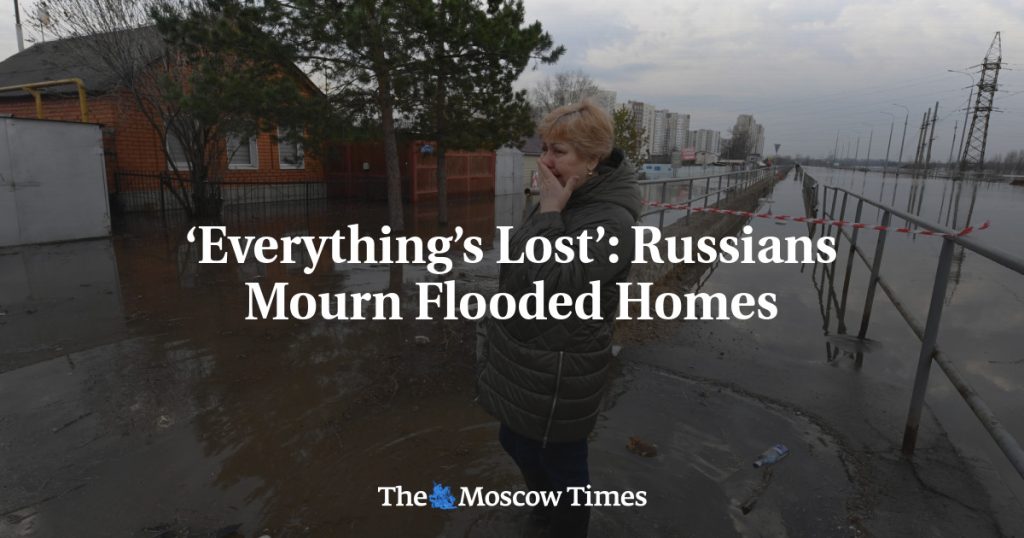Residents in Orenburg, Russia found themselves in a state of chaos as the River Ural burst its banks, leading to inundation of thousands of homes due to heavy rain and melting ice. The flooding, spanning a vast area across the city, affected many residential areas near the river, leaving many people displaced and struggling to salvage any belongings they could. Oksana Altynchurina, who managed to rescue her ginger cat and a few documents from her flooded flat, explained how the ground floor was underwater and most of their possessions were lost. The situation was dire for many residents, with some facing the loss of pets and significant personal items, while enduring the challenges of navigating through the floodwaters.
The Russian Emergency Situations Ministry reported that nearly 4,000 houses and blocks of flats in Orenburg were flooded, with water levels rising to the top of ground floors in some areas. Residents like Lyudmila Borodina, who had invested significant time and resources into their homes, were left devastated by the flooding, expressing fear and uncertainty about receiving official help. As the water levels continued to rise, locals banded together to support each other, with some cooking food for neighbors and others using boats to rescue possessions. Despite the crisis unfolding in their city, many residents felt abandoned by the government, echoing concerns about the lack of support and assistance in the midst of the disaster.
The heartbreaking stories of residents in Orenburg reflected the devastating impact of the floods, with many forced to evacuate their homes and grapple with the loss of cherished belongings. Altynchurina’s account of climbing through a window to escape the rising waters, while only managing to save essential documents, highlighted the sense of loss and helplessness experienced by those affected. The emotional toll of the flooding was evident in Borodina’s tearful response to seeing her house submerged in water, symbolizing the deeper trauma and upheaval faced by residents in the aftermath of the disaster. Despite the resilience shown by some individuals in the community, the overwhelming nature of the crisis left many feeling abandoned and overlooked by authorities.
As residents waded through the floodwaters, carrying children and pets to safety, the lack of government assistance became a glaring issue in the midst of the crisis. With homes almost completely underwater and possessions lost, individuals like Iskander Rakhmatullin took it upon themselves to provide support and sustenance to their neighbors in need. The absence of official aid and resources prompted frustration and anger among residents, as they struggled to cope with the aftermath of the flooding without adequate assistance. The plea for help, echoed by a man rowing a rubber dinghy down a flooded street, reflected the desperation and frustration felt by many residents who felt abandoned and neglected by the government in their time of need.
The scenes of devastation in Orenburg painted a grim picture of the impact of the flooding on the lives of residents, who were left grappling with loss, displacement, and uncertainty in the wake of the disaster. With water levels rising to unprecedented heights and homes submerged in muddy brown water, the city’s residents faced an uphill battle in salvaging what they could from the wreckage. Despite the challenges, stories of solidarity and community support emerged, showcasing the resilience and compassion of individuals in the face of adversity. However, the lack of government response and support remained a significant concern, leaving many residents feeling abandoned and overlooked as they navigated the long road to recovery from the devastating floods.
In the midst of a natural disaster that left homes destroyed and lives upended, the resilience and spirit of the residents in Orenburg shone through, as they banded together to support each other in the face of adversity. The stories of loss and survival, of grief and perseverance, painted a vivid picture of the human experience in the wake of a crisis. As the waters subsided and residents began the arduous task of rebuilding their lives, the need for government assistance and resources became more pressing than ever. The aftermath of the flooding in Orenburg served as a stark reminder of the importance of community resilience, government response, and collective action in the face of natural disasters, as residents worked towards reclaiming their homes and rebuilding their futures in the wake of unprecedented devastation.


